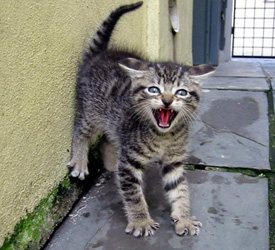No matter how many rattling balls, feathery toys or furry mice we bought at the local pet store, cat would play with for a while usually until cat managed to toss them under sofa/wardrobe/any given nook or cranny. Even after we have fished out mice/ball/whatever under any given piece of furniture, our hands were much interesting toys to play with for cat.

It is important to distinguish between playful biting and scratching and more aggressive form of biting and scratching that can be a sign of a bigger problem. Not that I approve of playful scratching of my hands mind, it should not be encouraged not unless you mind pain and scars anyway.
If you have young and extra exuberant kitten they might confuse your toys with legitimate cat toys. It is essential to curb this behavior at early age, as changes in behavior are much harder to accomplish with an older cat. It should be enough to firmly say "ouch" and remove your hands slowly from your cat's clutches.
Another thing that might prove even more efficient is to scruff your cat when he/she gets a hold of your hands. This is the same behavior mother cat would use. Since my kittens were abandoned by their mum this kind of a training method was double the shock for them and proved extremely efficient. So scruff your cat, say no, hold for a few seconds and then release. This should suffice.
You can also try with toys as plenty of toys around means your cat will have plenty of stuff to chew on and play with, however this might not work for cats that have short attention spans.
Aggressive chewing might have different causes one of which might be an underlying medical condition. Cats usually hide their medical problems so it is essential to observe your cat and learn to recognize what is normal behavior and not-so-normal behavior in your cat. If your cat scratches you when you try to pick him/her up when usually that is not the case, there might be a hidden wound, injury, hernia or some other type of medical condition that vet should diagnose and treat. Do not delay and take your cat to the vet.

Another type of aggressive behavior might be fear and/or redirected aggression. Your cat might see another cat in the yard or your garden, prowling on his/her territory and the reaction might be lash out on you or another cat in your household. This might mean you will have to obscure the view form the window or spray cat deterrent in the garden to prevent the intruder from coming for a visit again.
Also another thing that might lead to aggressive biting and scratching is over stimulation. While some cats might like to be petted for hours on end, others might not like it. The symptoms that your cat has been over stimulated for whatever reason usually are narrowed eyes and ears pulled back. If you are familiar with your cat and his/her behavior you should be able to recognize the symptoms so that the situation where your cat is overstimulated can be avoided.










